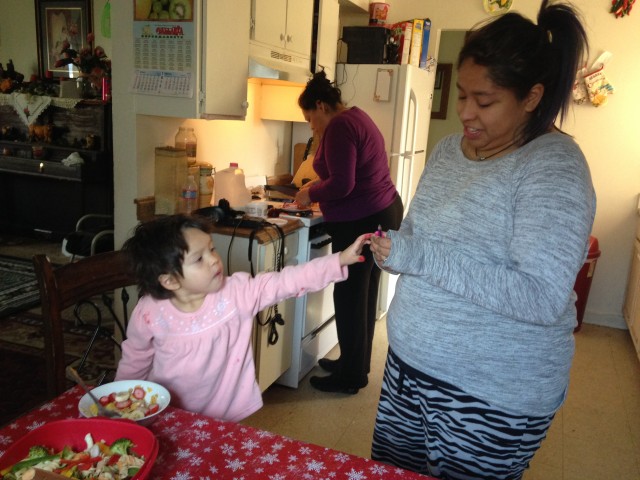“The people that can, should breast-feed,” she says. “Children need the extra vitamins and antibodies that breast milk has.”
Pressure to Skip Breast-feeding from Administrators, Friends
But she ran into some obstacles. For one, it was hard to find a private place where she could breast-feed or pump. When she told administrators she would likely need to pump every two hours, they gave her a list of all the possible cons: she would miss out on too much class time; she might lose credits; her grades might be affected.
Even the other young mothers thought she was odd for wanting to breast-feed. There was a lot of pressure to be more carefree.
“They were like, ‘Girl, why aren’t you out eating your lunch?’” Acker says.
She says she was encouraged to go a continuation school -- an alternative program that’s typically for at-risk kids. She finally agreed because it would be easier to breast-feed there. But it came with a cost. Acker says the school wasn't challenging.
Genevieve Colvin of Breastfeed LA says Acker’s story is pretty common. She says while many teenage moms don’t choose to breast-feed, those who do cite barriers at school.
“They are worried about completing their assignments and not having appropriate accommodations,” she said.
In fact, Colvin says only 18 percent of LA County’s school districts have policies for lactation accommodations and that lack of consistency is statewide. She says outside agencies like Women, Infants and Children (WIC) advocate for lactating students by making sure they have a safe private place to breast-feed, but systemically, school districts don’t take an active role in implementing policy.
Colvin says that's a problem because teen moms are already at a disadvantage. It’s important, she says, that when a woman is pregnant during her high school years, she has every opportunity to improve the life of her child and that includes being encouraged to breast-feed.
California has some of the strongest laws in the country to support working mothers who breast-feed, she ways, but high schools are different.
“We have very little substantive language in our education code that actually provides students with the same accommodations,” she says.
New Bill Addresses Accommodations for Breast-feeding
Assemblywoman Cristina Garcia (D-Bell Gardens) wants to strengthen that language. She recently sponsored Assembly Bill 302. She says the bill is simple and to the point.
“It doesn’t say you must have a lactation room or a pumping room. It says if you have a student that needs to lactate, you will create accommodations for them,” Garcia says.
It’s one more way to encourage young mothers to breast-feed while keeping them in a regular high school setting, she believes.
“A student at a traditional high school is going to have more opportunities and more options than a student at a continuation school,” Garcia says. Teen parents are already at a disadvantage, “I want to make sure that ... we don’t add to the layer of disadvantages that are there.”
It’s a policy Norma Acker wishes were in place when she went to high school. She’s proud to say she breast-fed her daughter for eight months, and she would have done so no matter what the cost.
“If it meant me dropping out of high school just to make her well, then I would do that,” she says. “If it meant that I would fail as a person myself but be the best mom I could be for her, I would do that.”
But Acker didn’t fail. She’s now in her second year of community college, and she’s still making sure her daughter eats well.
